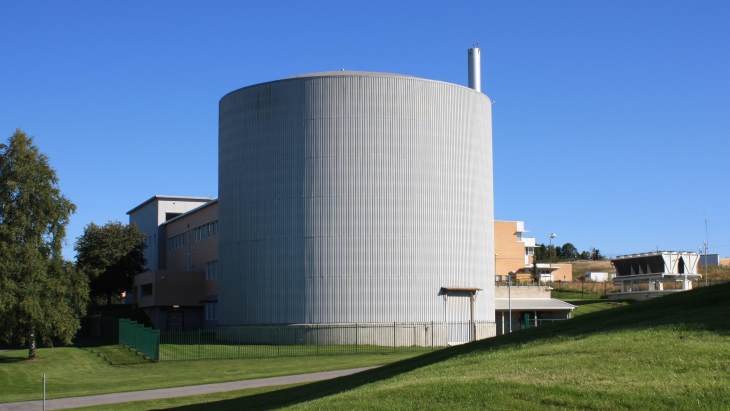Norwegian research reactor fuel to be recycled in UK
Norway's Institute for Energy Technology (IFE) has signed a contract with Westinghouse subsidiary Springfields Fuels Limited for the transfer of 3 tonnes of un-irradiated research reactor fuel to the UK for processing into new fuel for use in commercial nuclear power plants. The uranium fuel would otherwise have been treated as waste, stored and disposed of in Norway.

The JEEP-II research reactor at Kjeller, which shut down in April 2019 (Image: IFE)
IFE said the contract - signed on 21 May and valued at NOK24 million (USD2.9 million) - forms part of the clean-up after 70 years of nuclear activities in Norway and contributes to significantly reduce the amount of nuclear waste left in the country.
Prior to the transport of the first batch of fuel, necessary approval is required from the Norwegian Radiation and Nuclear Safety Authority. In addition, permission from the countries of origin for re-export needs to be obtained through the Ministry of Foreign Affairs. "These are time-consuming processes, and we therefore do not expect that we will be able to commence transport until 2022," IFE said. "In total, the export will take place over approximately two years, and will be spread over six transports."
Springfields will take the ownership of the fuel when it arrives at its plant near Preston, Lancashire, in the UK. The fuel will be used by as raw material for producing new nuclear fuel, to be used in nuclear power reactors.
"This agreement is an important part of the clean-up after Norway’s nuclear activities and a significant step forward to find a solution for our nuclear material," said IFE CEO Nils Morten Huseby.
Norway's two research reactors - the nuclear fuel and materials testing reactor at Halden and the JEEP-II neutron scattering facility at Kjeller - were declared permanently shut down in June 2018 and April 2019, respectively. In addition to the research reactors, there are several other nuclear facilities that will be decommissioned and a wide range of nuclear waste that must be handled and disposed of in a safe way. The clean-up activities are estimated to cost over NOK21 billion and will last for at least 20 years.
Norwegian Nuclear Decommissioning (NND), established in 2018 as a government agency under the Ministry of Trade, Industry and Fisheries, is responsible for decommissioning the research reactors and other related nuclear infrastructure. NND is also responsible for the safe handling, storage and disposal of nuclear waste in Norway.
IFE and Springfields are the contractual partners, but according to the contract NND will take over IFE's obligations when its nuclear assets are transferred to NND in the future. IFE's nuclear facilities and personnel are planned to be transferred to NND at the start of 2024, provided that the necessary licences and permits are in place.
Speaking about the contract with Springfields, Peter Bennett, project manager at IFE/NND, noted there are some challenges with the storage and disposal of un-irradiated uranium over a longer period of time. "We are talking about a time horizon of over 100,000 years. If the material is to be stored for such a long time, other nuclides with a long half-life will start to form. This makes it more challenging to develop safe and secure deposition solutions.
"Since the material is un-irradiated and unused, it is in fact a resource that has value for the nuclear power industry. The material is a raw material that can be used to make new nuclear fuel."
NND Chief Technology Director Nils Bøhmer added, "For NND, it is important to reduce the amount of radioactive material that we have to take care of in Norway. The fact that this uranium can now be used by Springfields will therefore be a step towards reducing our future clean-up costs."
Researched and written by World Nuclear News
- China Institute of Atomic Energy
- Nuclear Power Institute of China
- Southwestern Institute of Physics
- China Nuclear Power Operation Technology Corporation, Ltd.
- China Nuclear Power Engineering Co., Ltd.
- China Institute for Radiation Protection
- Beijing Research Institute of Uranium Geology (BRIUG)
- China Institute of Nuclear Industry Strategy (CINIS)
- China Nuclear Mining Science and Technology Corporation


